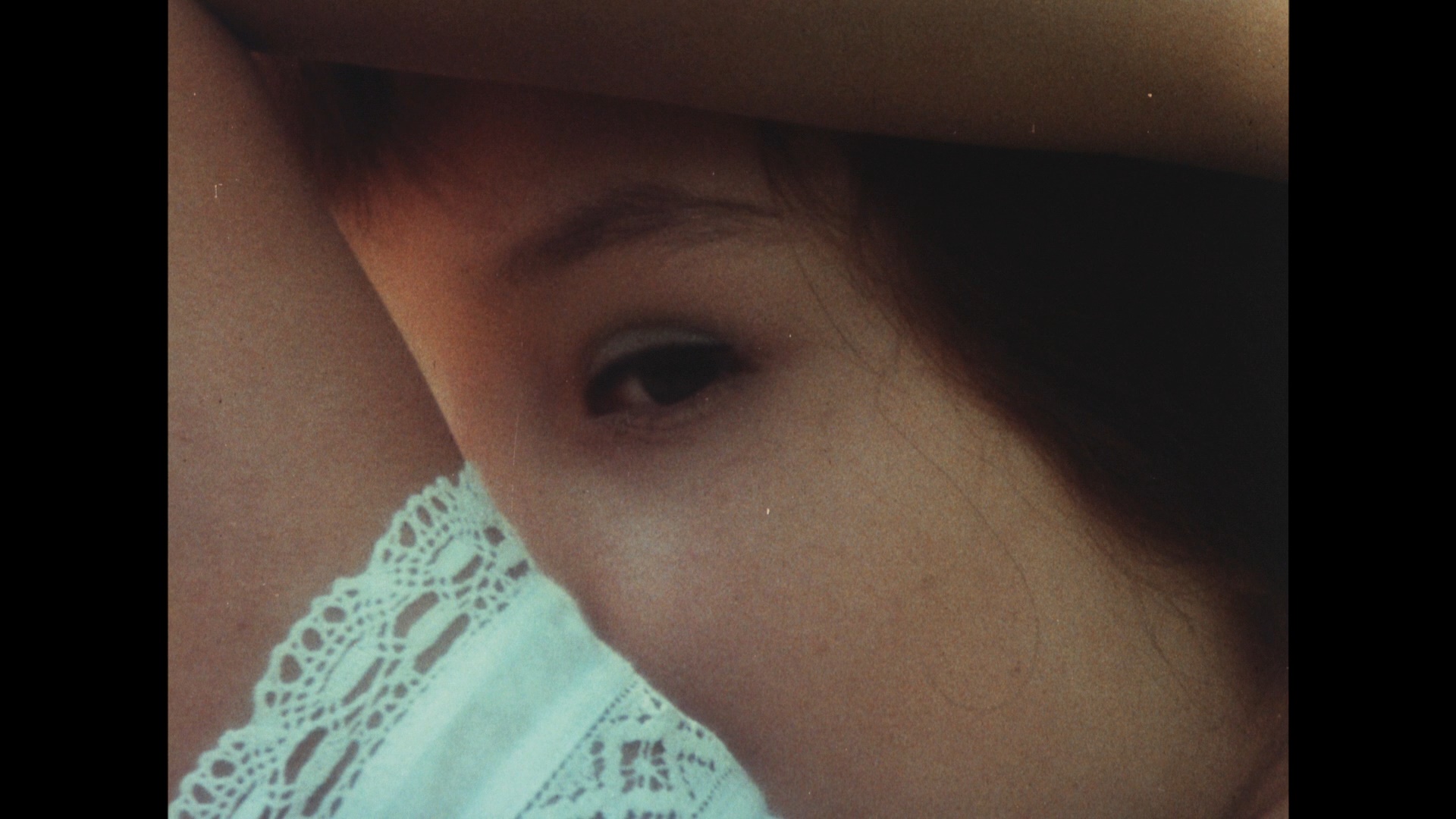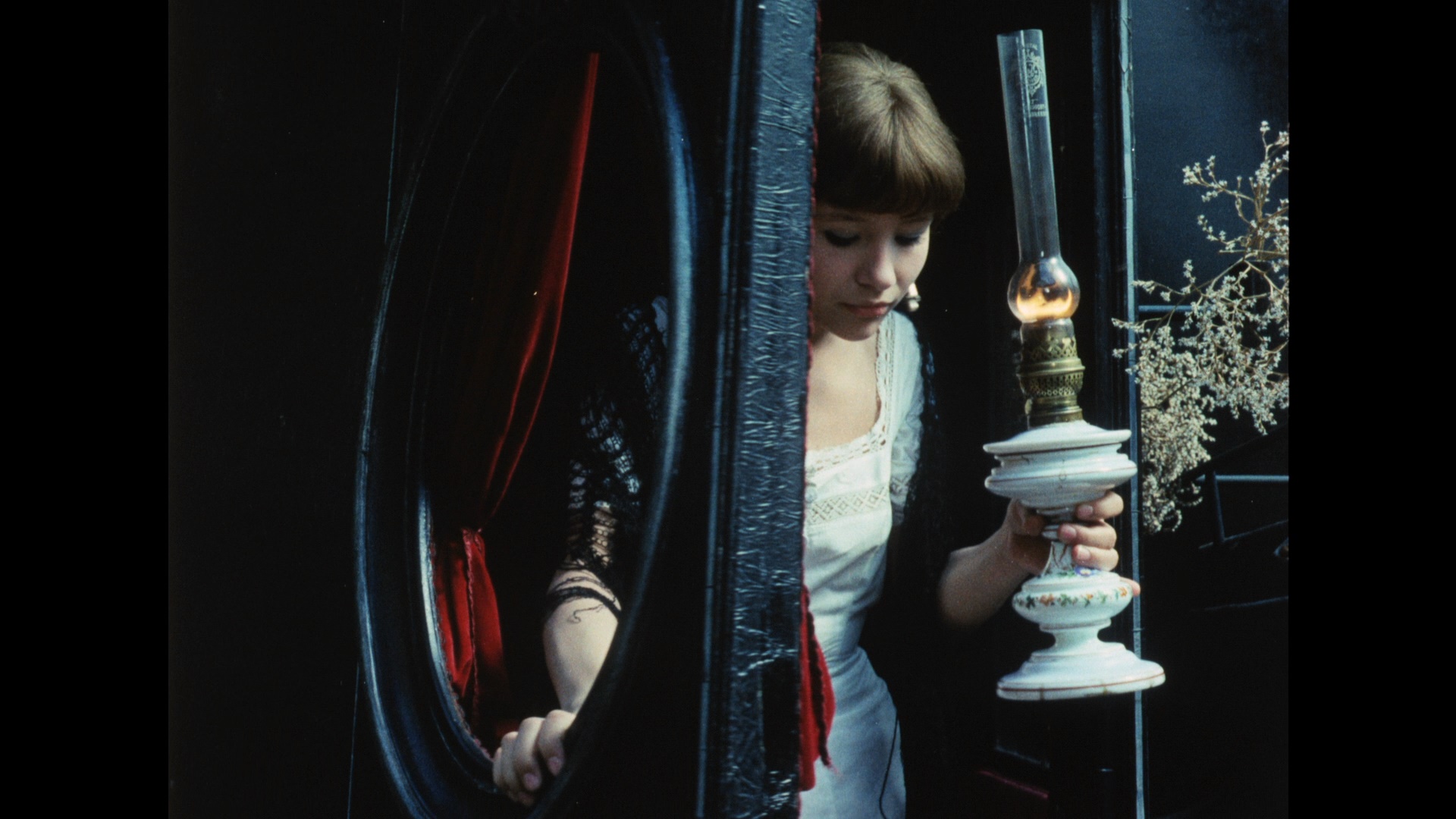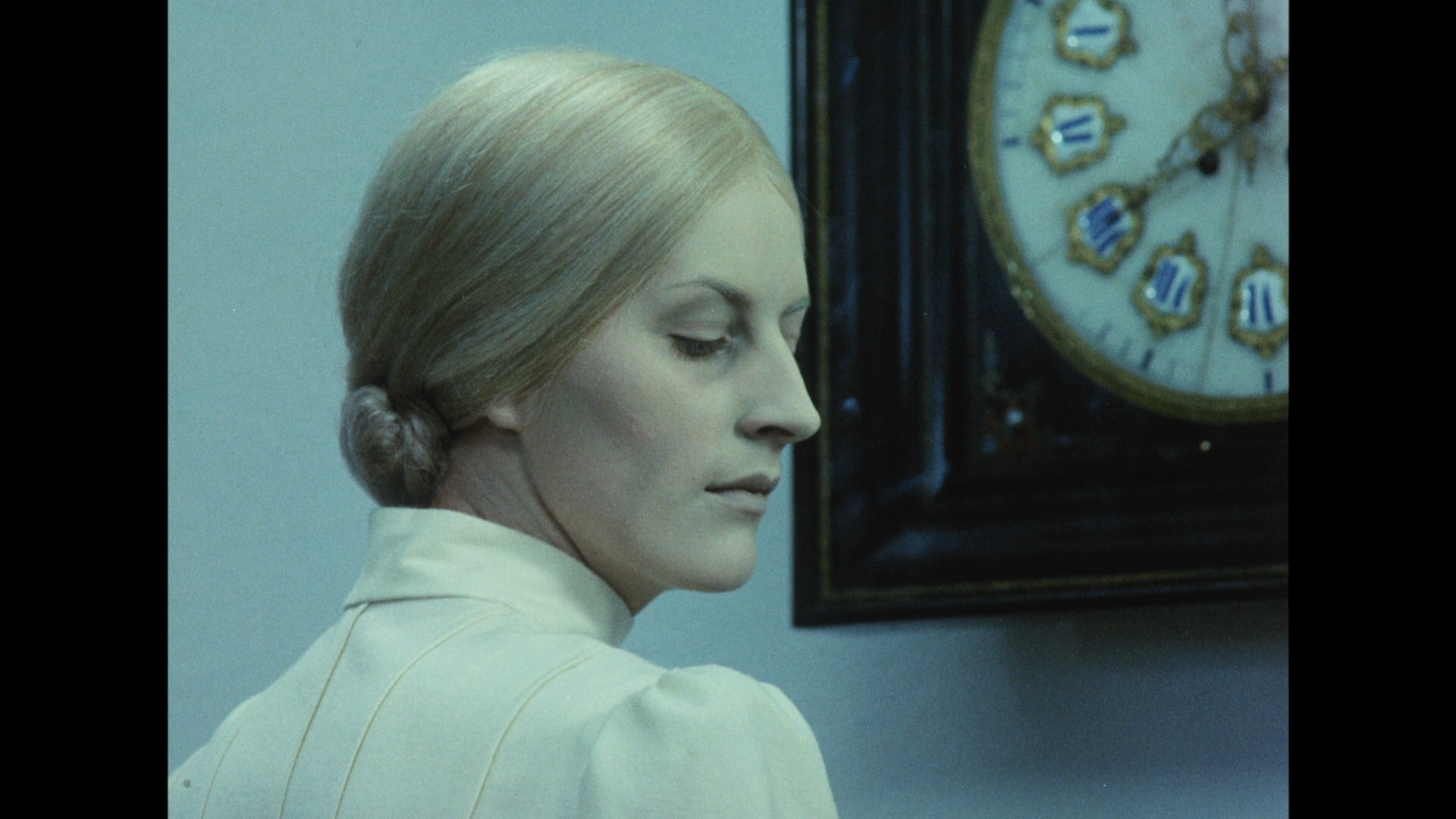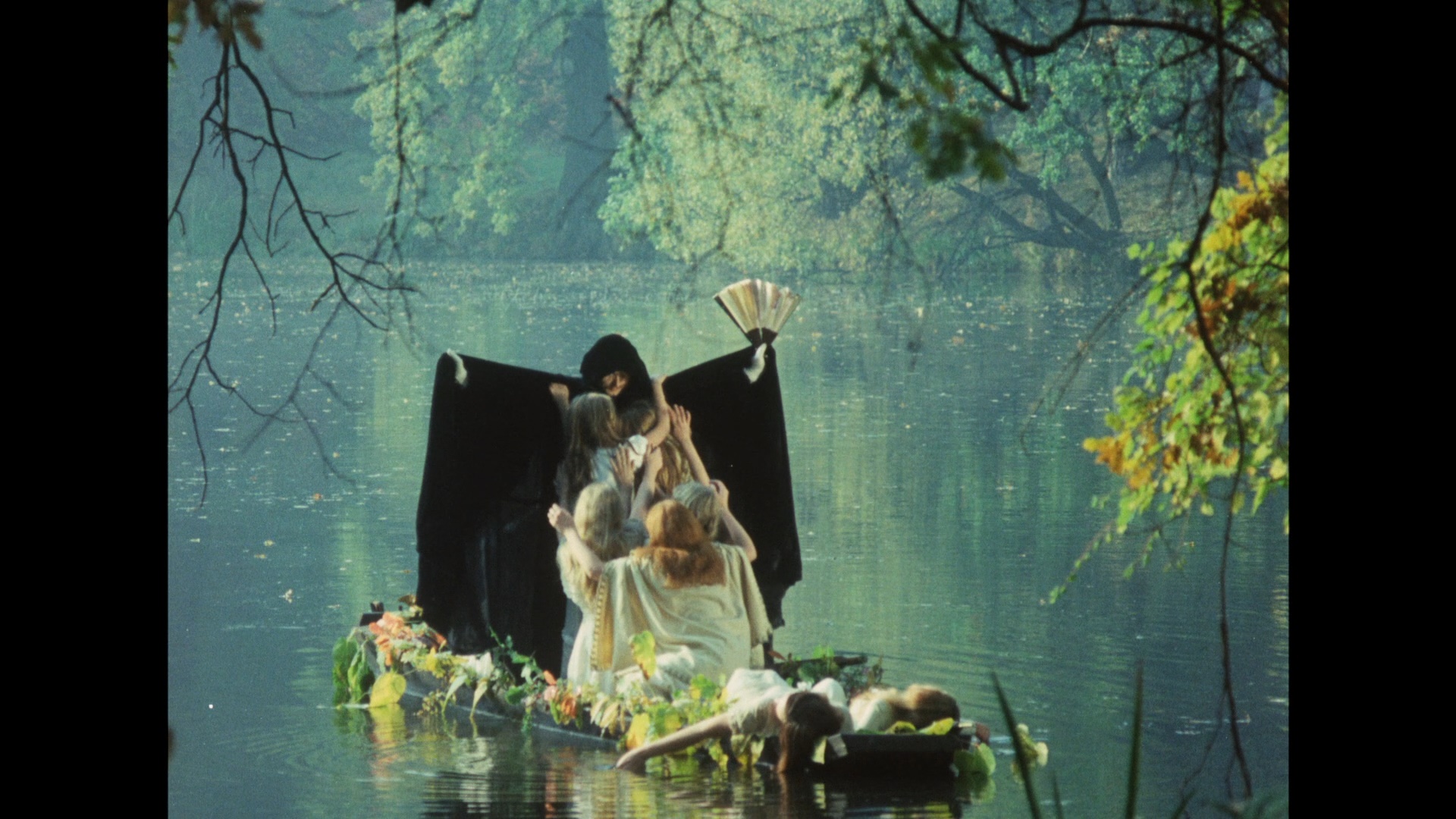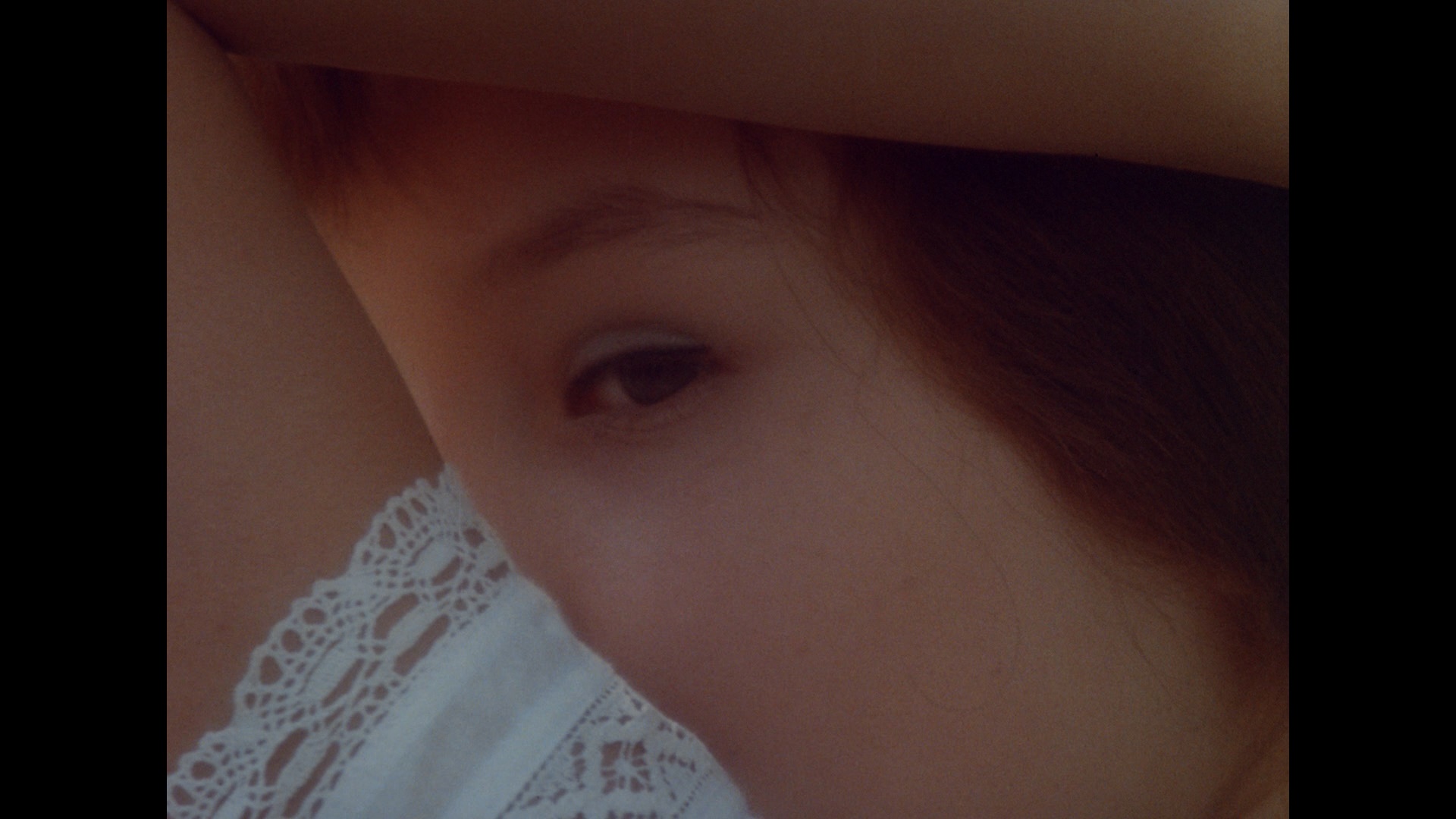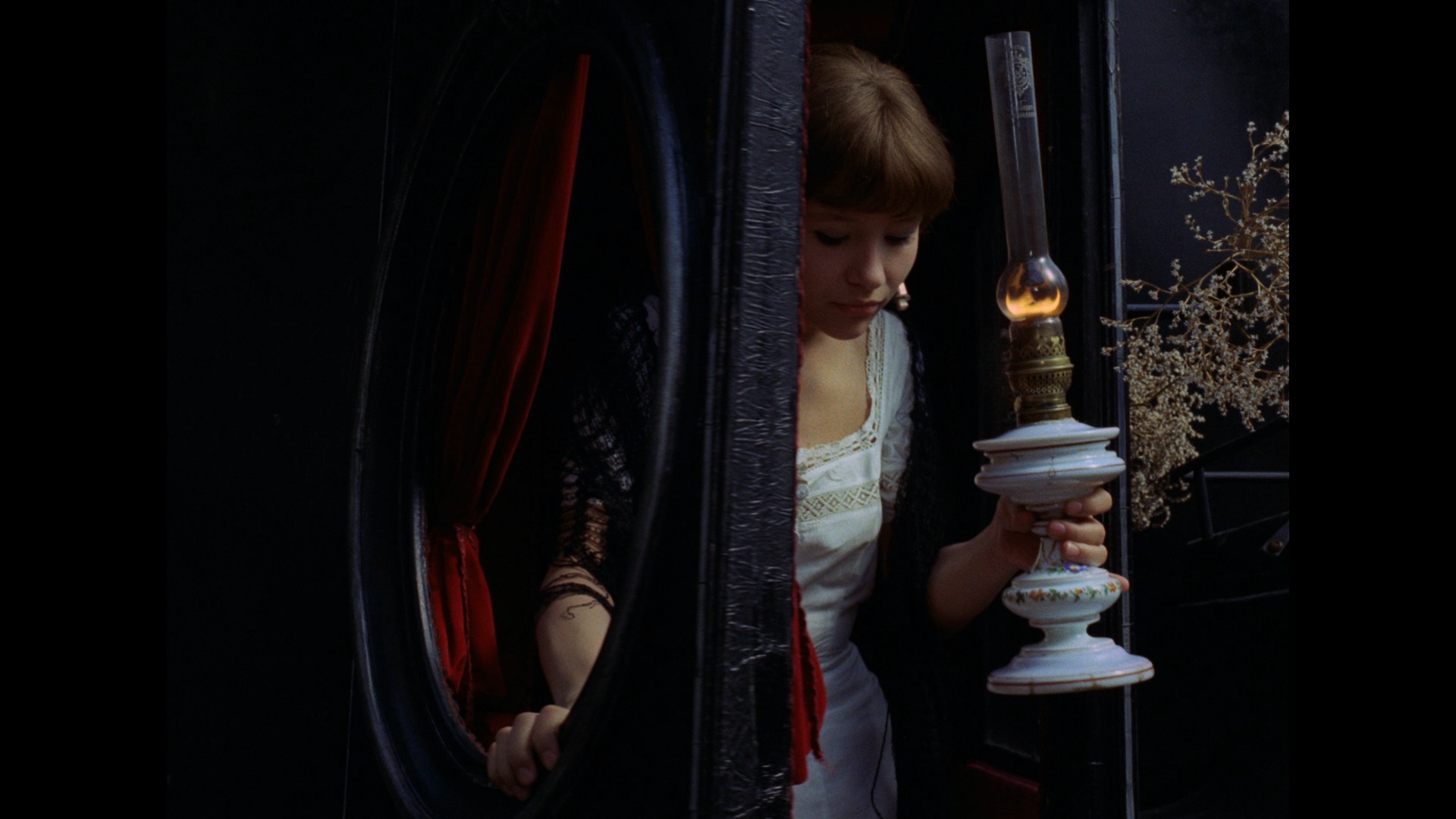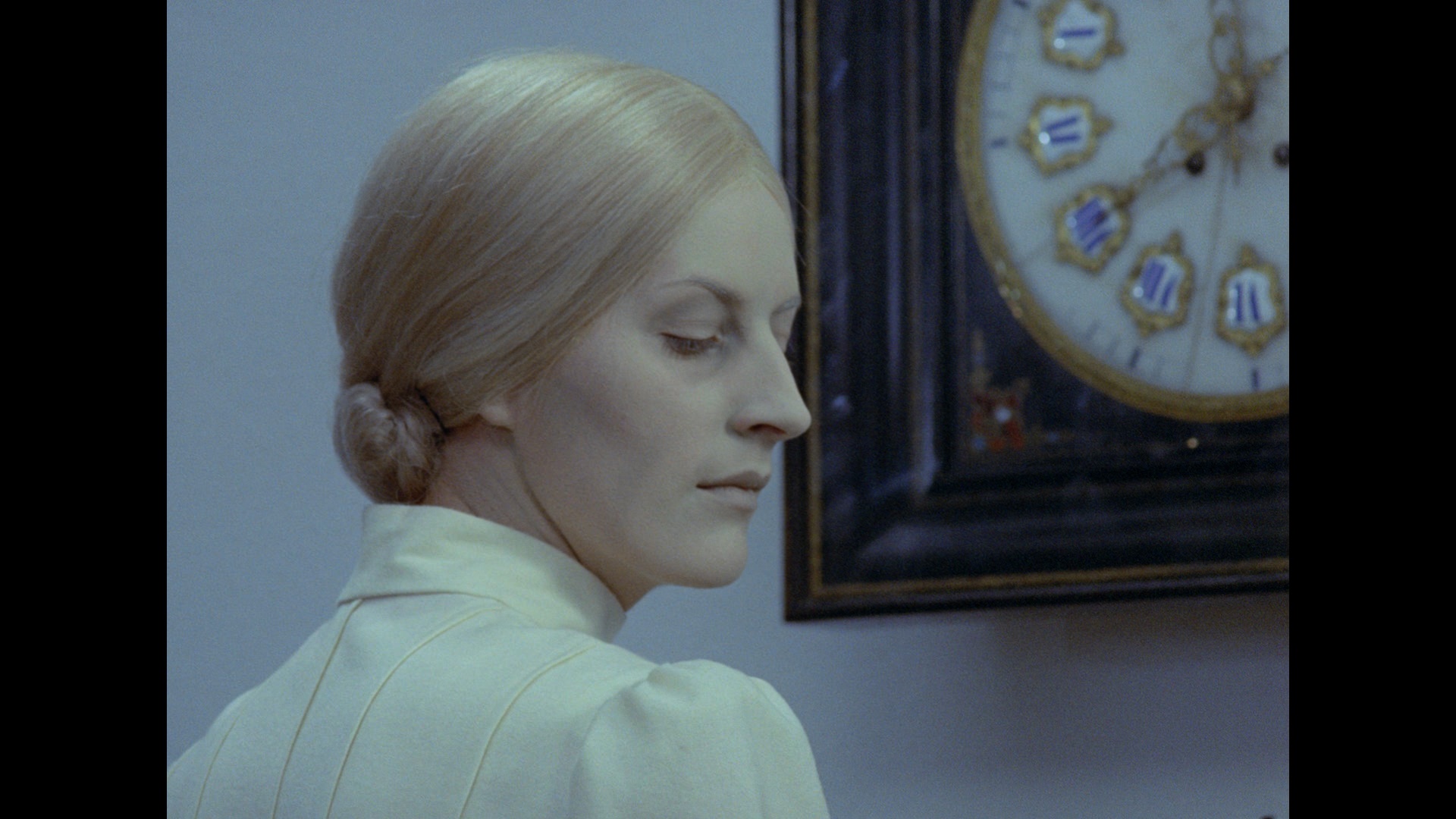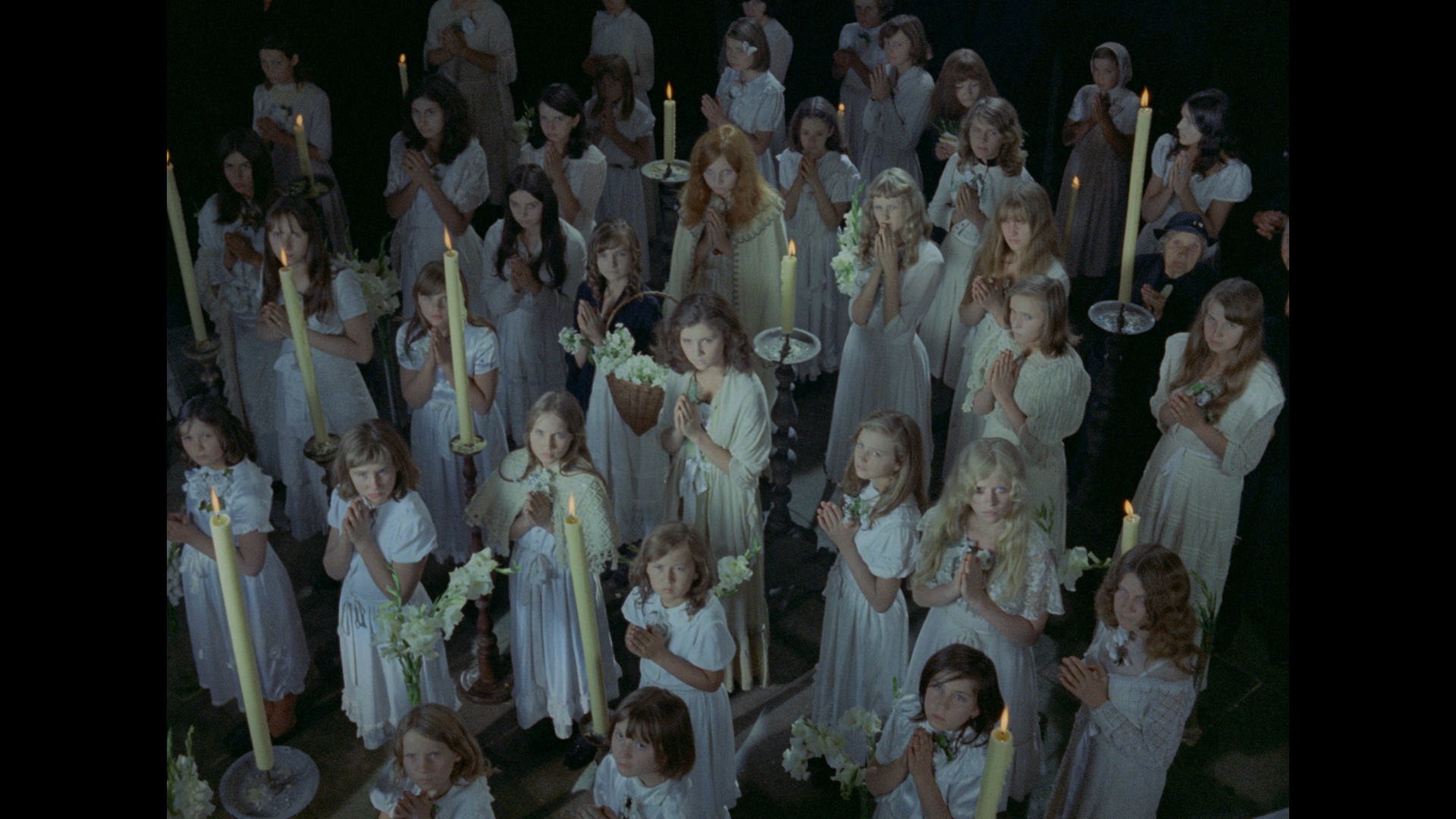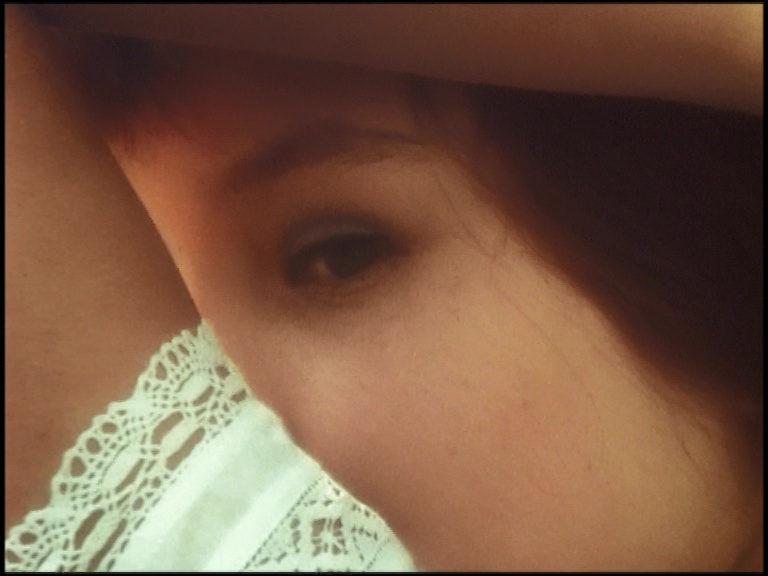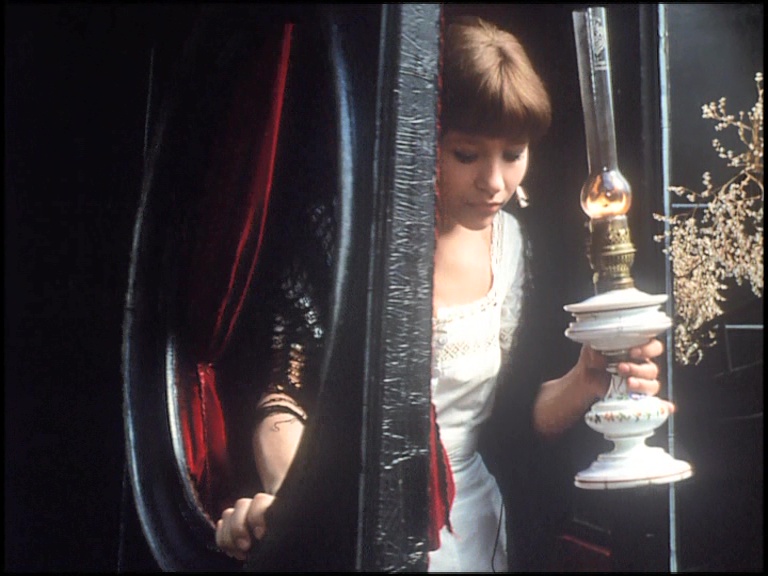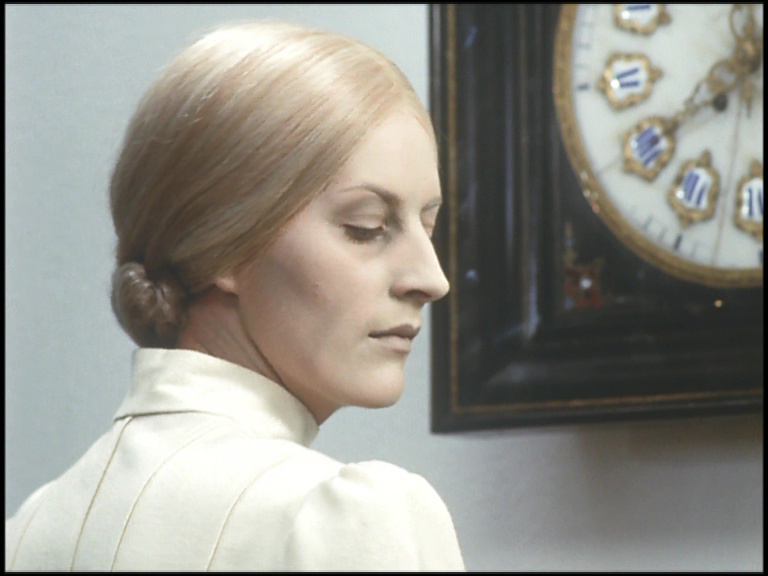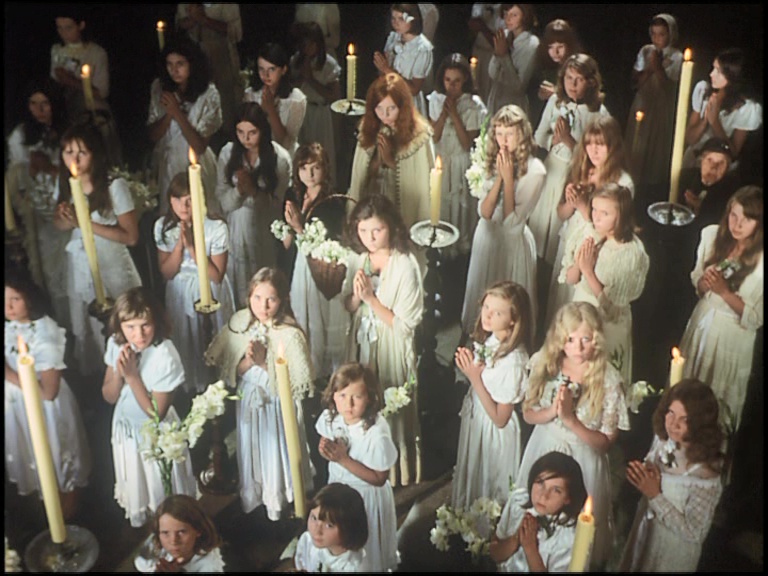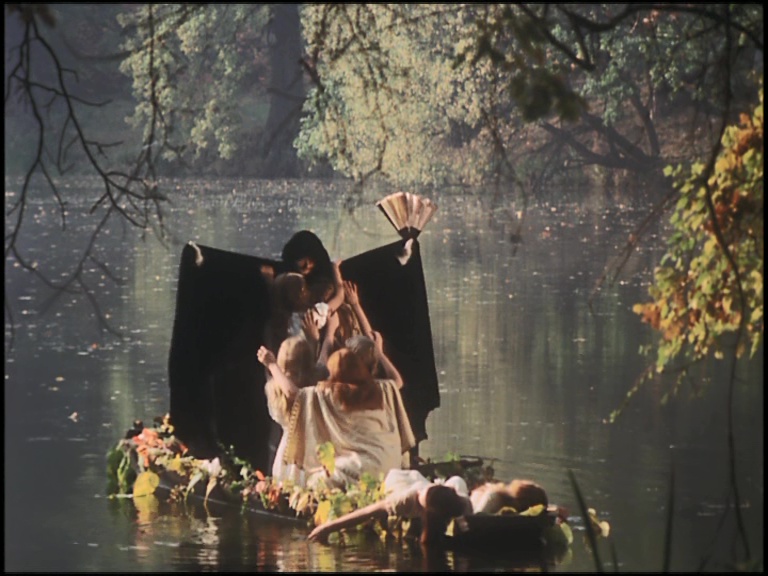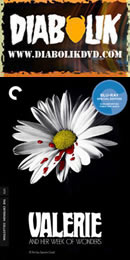
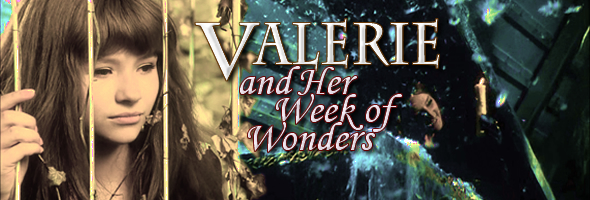
Color, 1970, 77 mins. 1 sec.
Directed by Jaromil Jires
Starring Jaroslava Schallerová, Helena Anýzová, Petr Kopriva, Jirí Prýmek, Jan Klusák
Second Run (Blu-ray & DVD) (UK R0 HD/PAL), Criterion (Blu-ray & DVD) (US RA/R1 HD/NTSC), Redemption (DVD) (UK R0 PAL), Facets (DVD) (US R1 NTSC), Bildstörung (DVD) (Germany R2 PAL), CCV (DVD) (Czech Republic R0 PAL), Trash Mountain (DVD) (Japan R2 NTSC)
 small village, frequently
small village, frequently 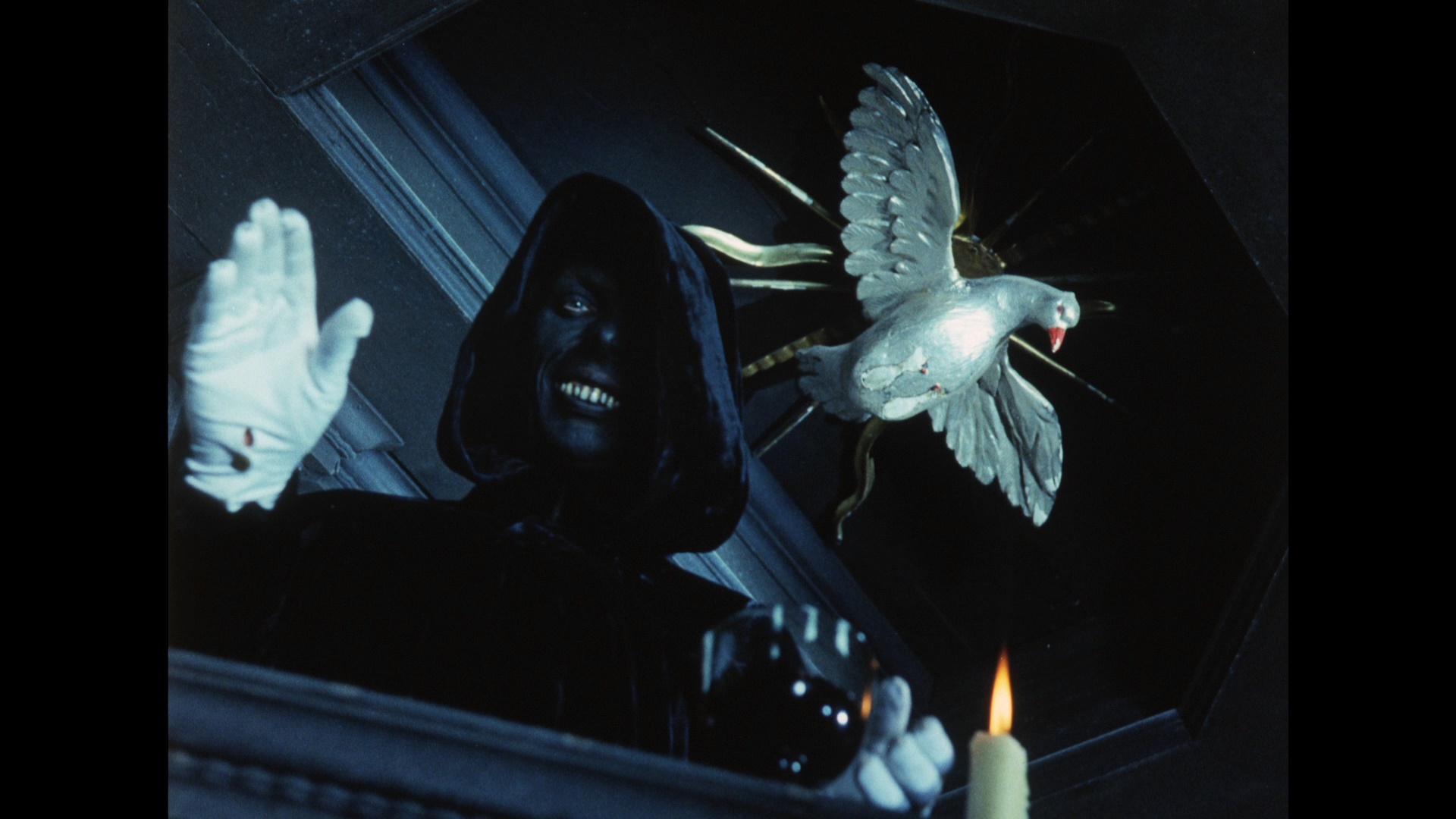 napping orphan Valerie (Schallerová) lives with her puritanical grandmother (Anýzová) and tends to the family's farm animals, which tend to get attacked by a marauding weasel. Her transition to adolescence is triggered by a sudden string of events including her growing fondness for a handsome but persecuted local youth named Eagle (Kopriva) and the frightening appearance of a bald, grinning vampire (Prýmek). Her grandmother mysteriously disappears, apparently after being seduced and spirited away by the vampire, followed by the arrival of Valerie's beautiful cousin who looks an awful lot like a younger version of granny -- and who apparently wants to drink Valerie's blood. The local priest (Klusák) has different predatory designs on Valerie as well, and when she brushes off his advances, he joins the undead throng who draw the girl through an increasingly surreal, dreamlike succession of adventures.
napping orphan Valerie (Schallerová) lives with her puritanical grandmother (Anýzová) and tends to the family's farm animals, which tend to get attacked by a marauding weasel. Her transition to adolescence is triggered by a sudden string of events including her growing fondness for a handsome but persecuted local youth named Eagle (Kopriva) and the frightening appearance of a bald, grinning vampire (Prýmek). Her grandmother mysteriously disappears, apparently after being seduced and spirited away by the vampire, followed by the arrival of Valerie's beautiful cousin who looks an awful lot like a younger version of granny -- and who apparently wants to drink Valerie's blood. The local priest (Klusák) has different predatory designs on Valerie as well, and when she brushes off his advances, he joins the undead throng who draw the girl through an increasingly surreal, dreamlike succession of adventures. 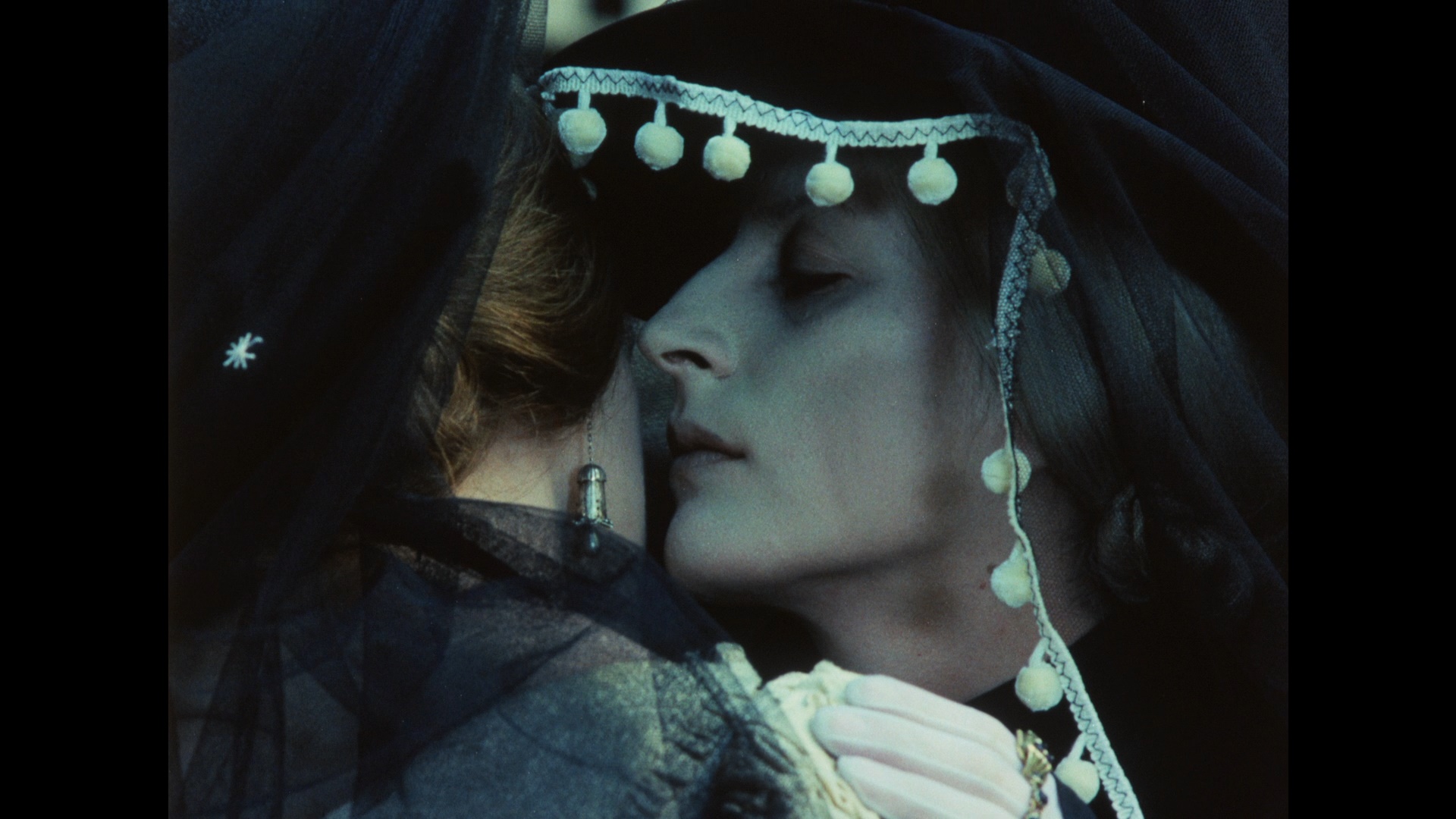 heavily symbolic story hews very closely to the source novel by Vítezslav Nezval (also known to moviegoers for penning
heavily symbolic story hews very closely to the source novel by Vítezslav Nezval (also known to moviegoers for penning  Jirí Trnka's The Emperor's Nightingale in 1949), but on film it's an incredibly abstract, disorienting experience that flows more in a subconscious, intuitive fashion than your average horrific fantasy. The vampiric elements are also handled much more giddily than people like Hammer were accustomed to at the time, while sparing but effective doses of minor eroticism (including some startling implied incest) are treated so casually no one ever considered giving the film any censorship problems. This also happens to be one of the most beautifully filmed fantasies of all time, with each scene delivering multiple indelible images.
Jirí Trnka's The Emperor's Nightingale in 1949), but on film it's an incredibly abstract, disorienting experience that flows more in a subconscious, intuitive fashion than your average horrific fantasy. The vampiric elements are also handled much more giddily than people like Hammer were accustomed to at the time, while sparing but effective doses of minor eroticism (including some startling implied incest) are treated so casually no one ever considered giving the film any censorship problems. This also happens to be one of the most beautifully filmed fantasies of all time, with each scene delivering multiple indelible images. 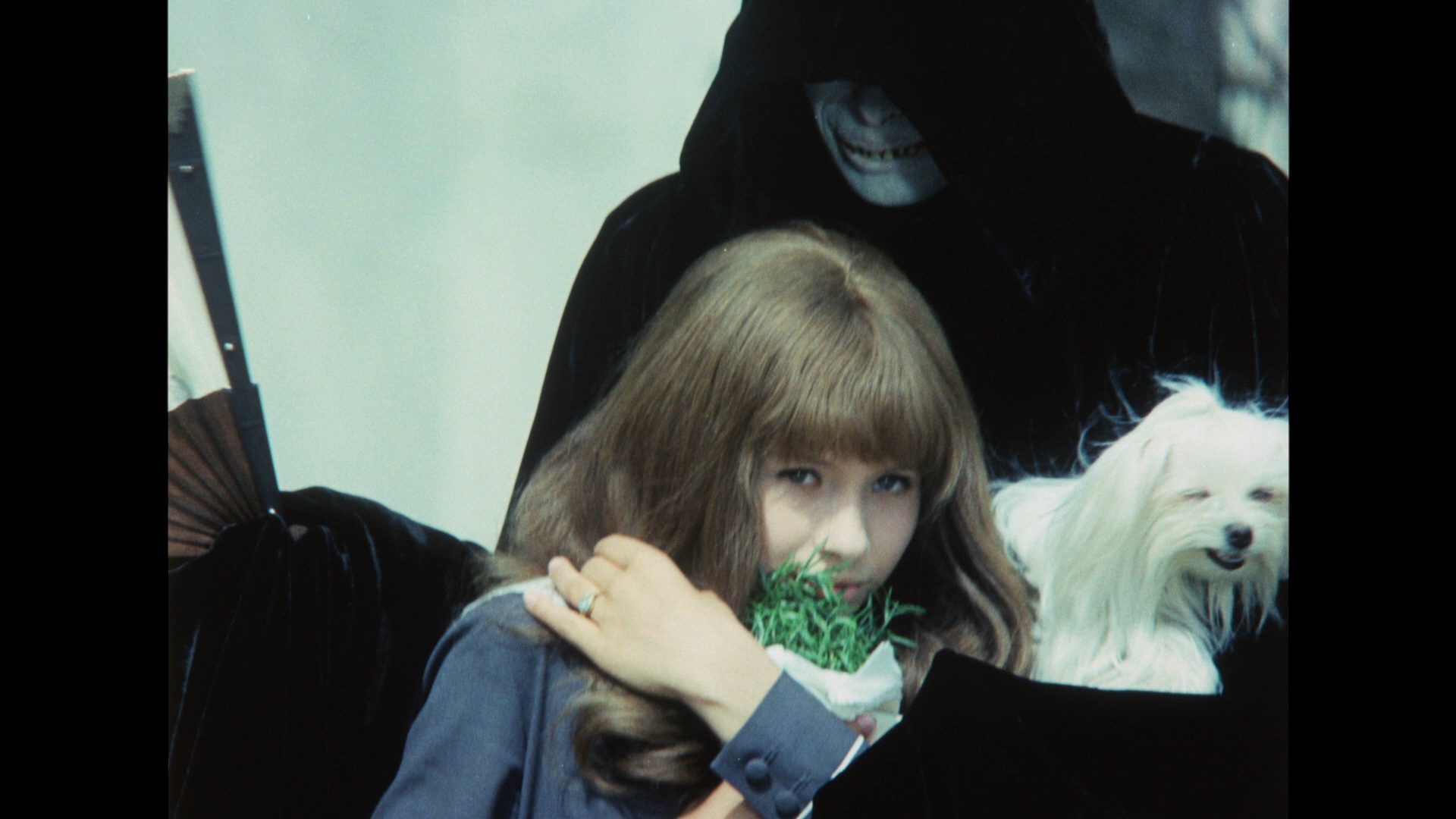 arrived via Second Run's UK reissue in 2008, which features a dramatically improved, remastered
arrived via Second Run's UK reissue in 2008, which features a dramatically improved, remastered 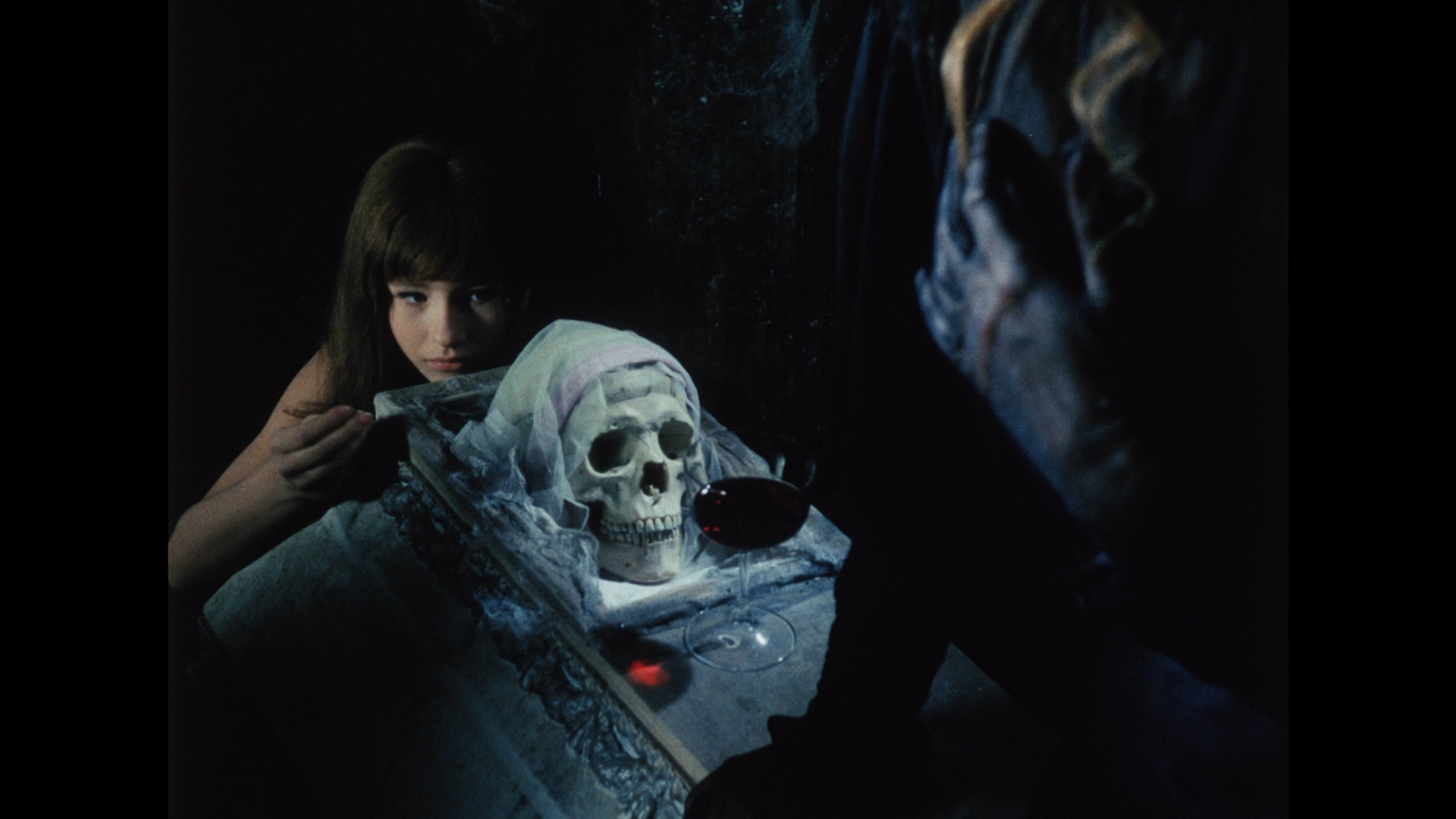 transfer that finally resembles the excellent prints seen on theater screens. Color and detail are all markedly better, and it's also the cleanest, most intact film element used to that point. The English subs are optional as well and much better than any predecessors. Extras include a newly created trailer, a new video interview with Schallerová (6m7s) about her memories from the set, a terrific "introduction" by film writer Michael Brooke (20m58s) that actually offers more useful insight than most standard featurettes, and a booklet containing appreciative essays by Peter Hames and Joseph A. Gervasi.
transfer that finally resembles the excellent prints seen on theater screens. Color and detail are all markedly better, and it's also the cleanest, most intact film element used to that point. The English subs are optional as well and much better than any predecessors. Extras include a newly created trailer, a new video interview with Schallerová (6m7s) about her memories from the set, a terrific "introduction" by film writer Michael Brooke (20m58s) that actually offers more useful insight than most standard featurettes, and a booklet containing appreciative essays by Peter Hames and Joseph A. Gervasi. 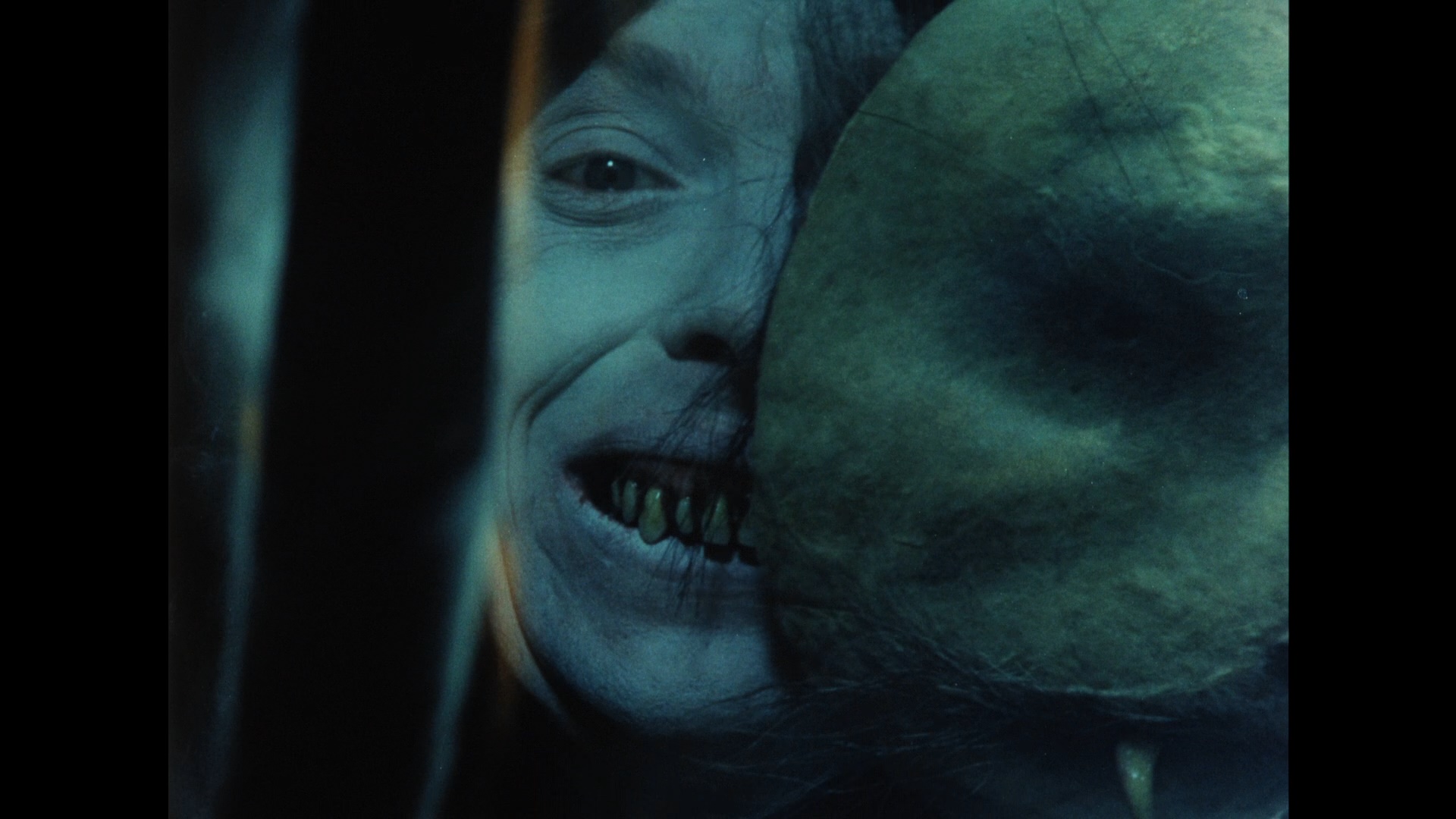
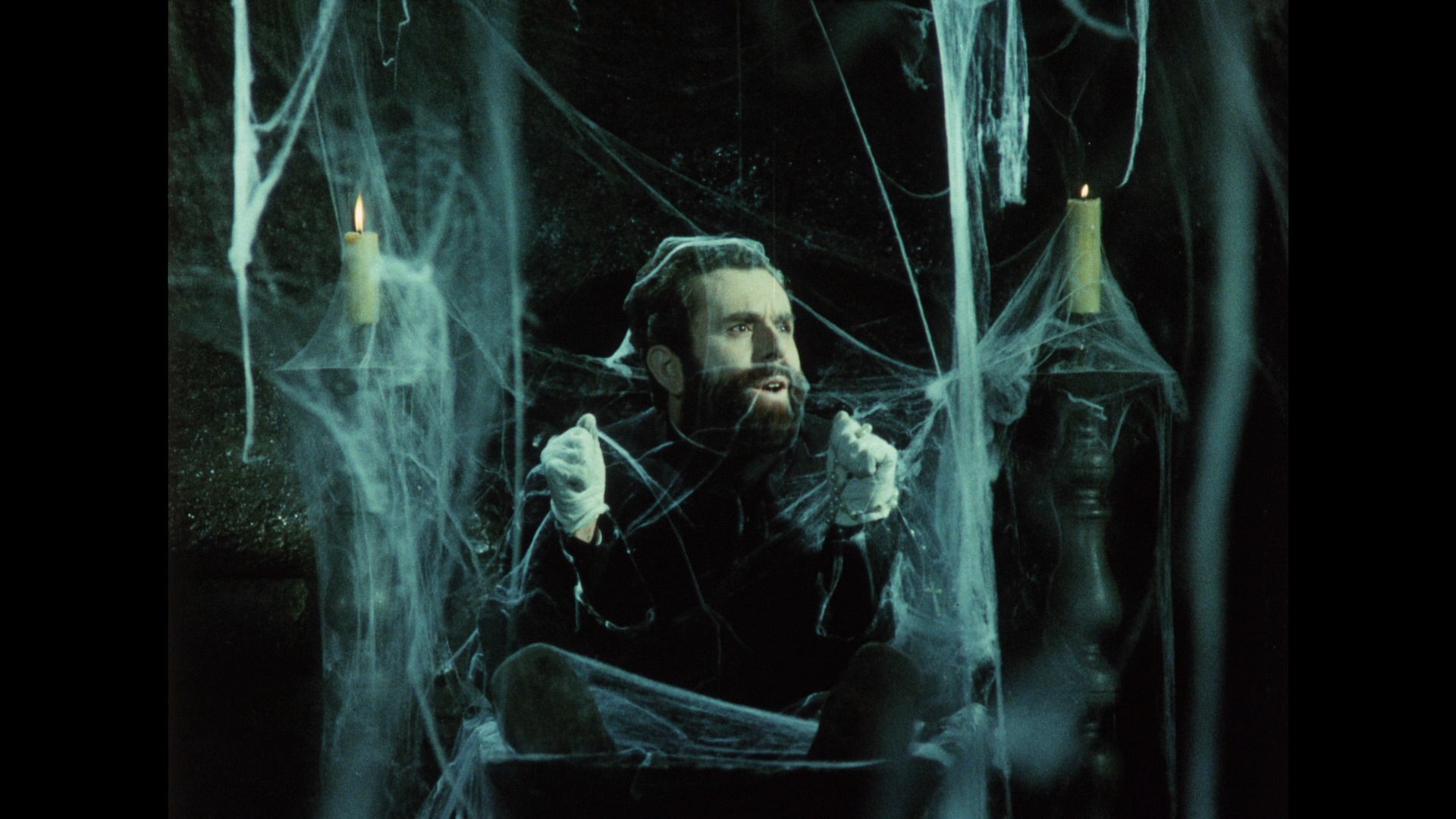 Five years later in 2015, the film finally got its due in the United States from Criterion courtesy of separate Blu-ray and DVD releases. The major news here is that it's the first time English-speaking viewers could watch it with the Valerie Project score, with both the film and music at correct film speed for the first time as well. The DTS-HD MA mono audio for the original soundtrack sounds excellent, the fullest and cleanest it's ever been to date, while the Valerie Project score is presented in standard two-channel Dolby Digital. (A pity it's not lossless as well, but it still sounds very good.) The new HD transfer looks much more detailed and textured than any of its predecessors, with the outdoor scenes in particular offering a wealth of fine layers of shading and depth. Unfortunately the entire color has shifting radically to the teal side, one of the earlier examples of an irritating, destructive video plague that has afflicted other Blu-rays ranging from The King and I to Je t'aime, je t'aime. The problem here is that the extreme color shift demolishes any pure white in the film, which is deeply destructive to the importance that hue plays throughout as well as the original sun-blasted look that now seems to have turned into a constant state of dusk.
Five years later in 2015, the film finally got its due in the United States from Criterion courtesy of separate Blu-ray and DVD releases. The major news here is that it's the first time English-speaking viewers could watch it with the Valerie Project score, with both the film and music at correct film speed for the first time as well. The DTS-HD MA mono audio for the original soundtrack sounds excellent, the fullest and cleanest it's ever been to date, while the Valerie Project score is presented in standard two-channel Dolby Digital. (A pity it's not lossless as well, but it still sounds very good.) The new HD transfer looks much more detailed and textured than any of its predecessors, with the outdoor scenes in particular offering a wealth of fine layers of shading and depth. Unfortunately the entire color has shifting radically to the teal side, one of the earlier examples of an irritating, destructive video plague that has afflicted other Blu-rays ranging from The King and I to Je t'aime, je t'aime. The problem here is that the extreme color shift demolishes any pure white in the film, which is deeply destructive to the importance that hue plays throughout as well as the original sun-blasted look that now seems to have turned into a constant state of dusk.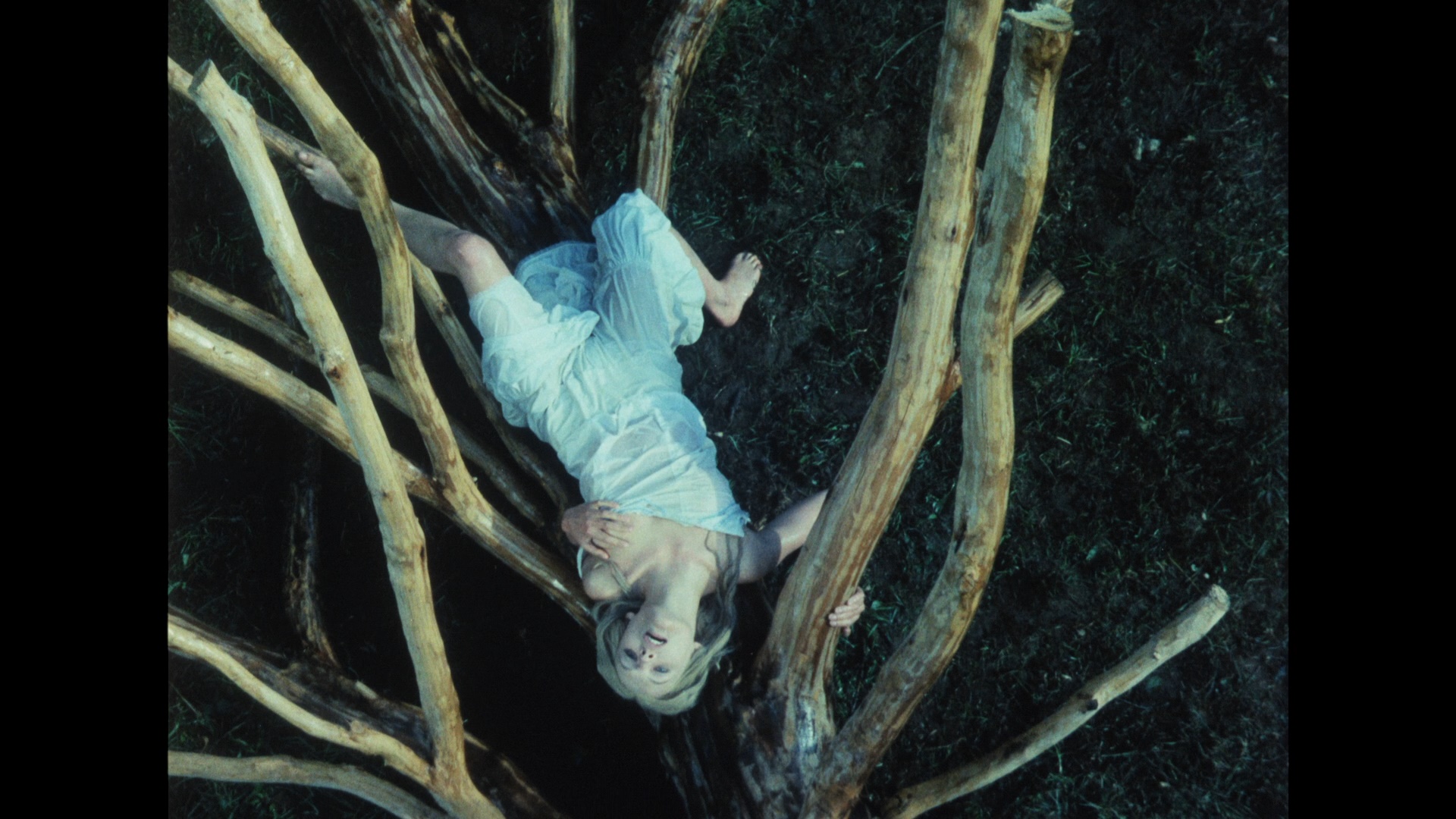 childlike innocence in the face of a threatening world. In the new HD featurette "Resurrecting the Avant-Garde," Hames offers a
childlike innocence in the face of a threatening world. In the new HD featurette "Resurrecting the Avant-Garde," Hames offers a 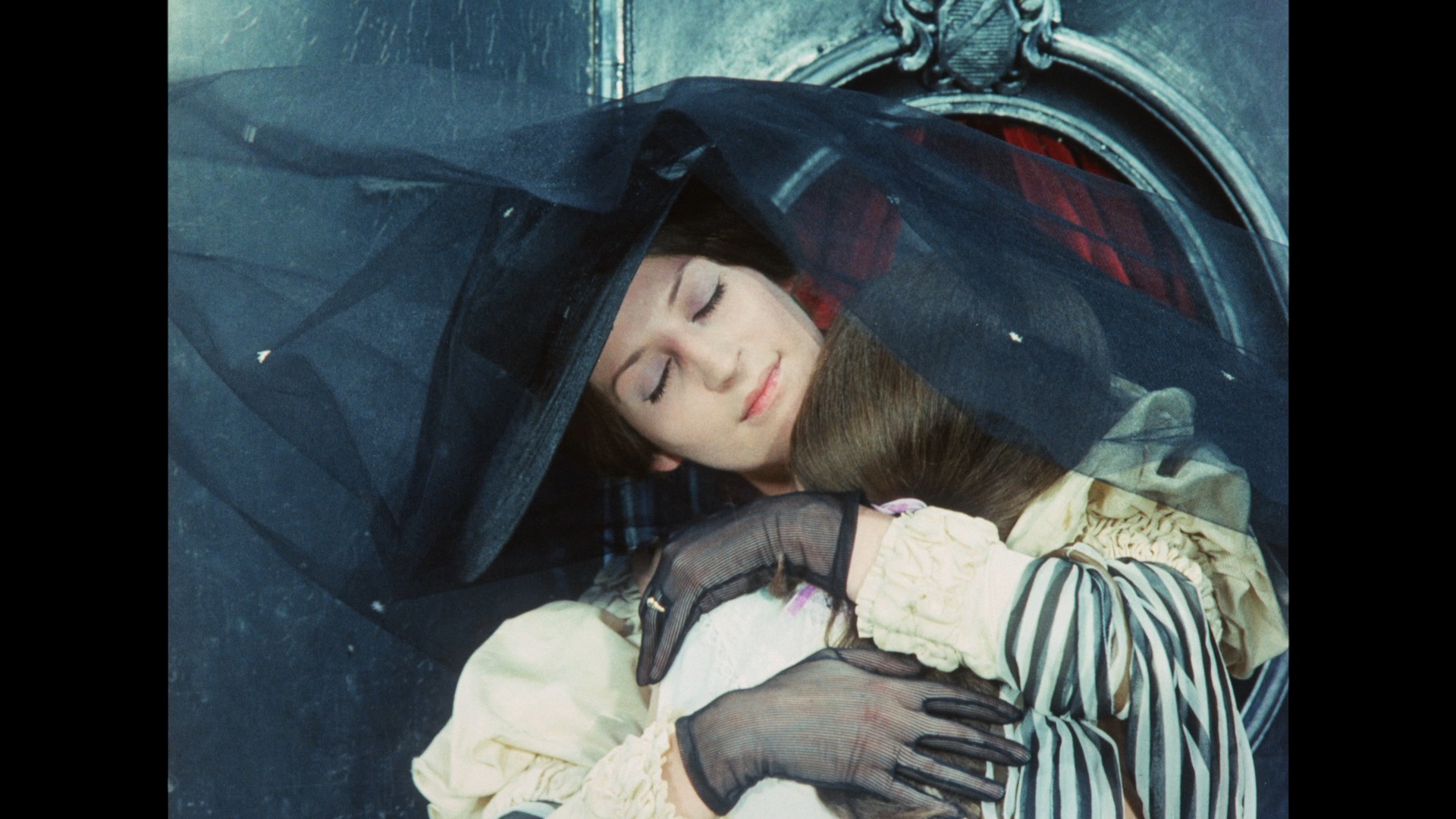 15m54s breakdown of this film's unusual genre classifications and its role in the experimental narratives of the period alongside other challenging fare from other European countries. The earlier Schallerova and Klusak interviews from the older featurette are presented here separately (with English subtitles), with the latter getting in some great moments about his role as the "perverted friar." In "More than a Soundtrack" (15m28s), Valerie Project co-founders Gervasi and Greg Weeks offer a fascinating exploration of how the live performance and composition came about starting with discussions at Exhumed Films events as other potential titles like Possession were considered along the way. The rehearsal process and elaborate instrumentations are explained in depth as well, all of which should enhance your enjoyment of the end result. The packaging also includes liner notes by Jana Prikryl, who puts the film in context with the social and political shifts in the Czech Republic at the time as many filmmakers were being censored by the government.
15m54s breakdown of this film's unusual genre classifications and its role in the experimental narratives of the period alongside other challenging fare from other European countries. The earlier Schallerova and Klusak interviews from the older featurette are presented here separately (with English subtitles), with the latter getting in some great moments about his role as the "perverted friar." In "More than a Soundtrack" (15m28s), Valerie Project co-founders Gervasi and Greg Weeks offer a fascinating exploration of how the live performance and composition came about starting with discussions at Exhumed Films events as other potential titles like Possession were considered along the way. The rehearsal process and elaborate instrumentations are explained in depth as well, all of which should enhance your enjoyment of the end result. The packaging also includes liner notes by Jana Prikryl, who puts the film in context with the social and political shifts in the Czech Republic at the time as many filmmakers were being censored by the government. 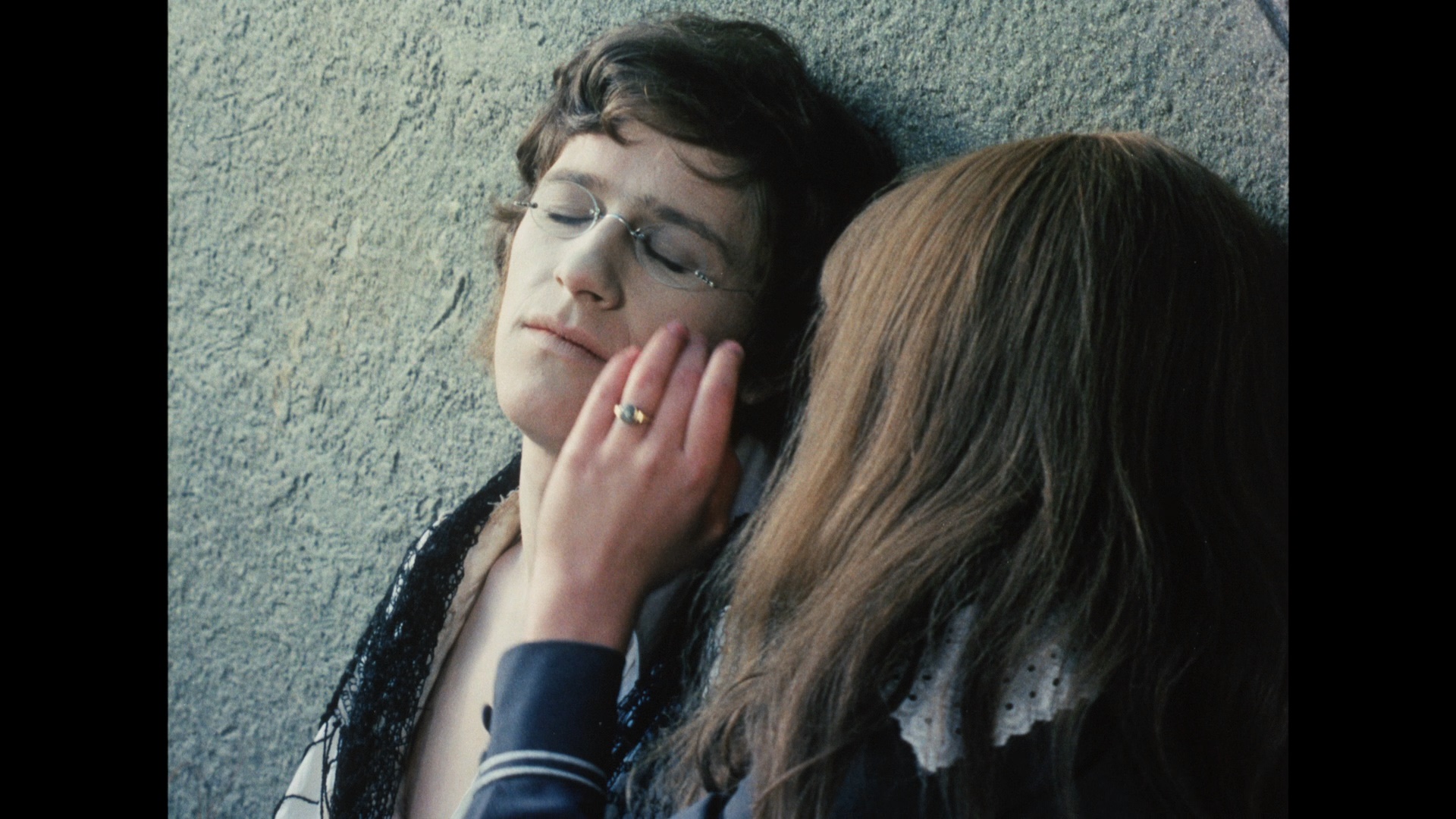 which one you prefer. The Czech LPCM mono track sounds as good as always, with optional English subtitles provided. The Schallerová interview, Brooke intro, insert booklet, and trailer are ported
which one you prefer. The Czech LPCM mono track sounds as good as always, with optional English subtitles provided. The Schallerová interview, Brooke intro, insert booklet, and trailer are ported 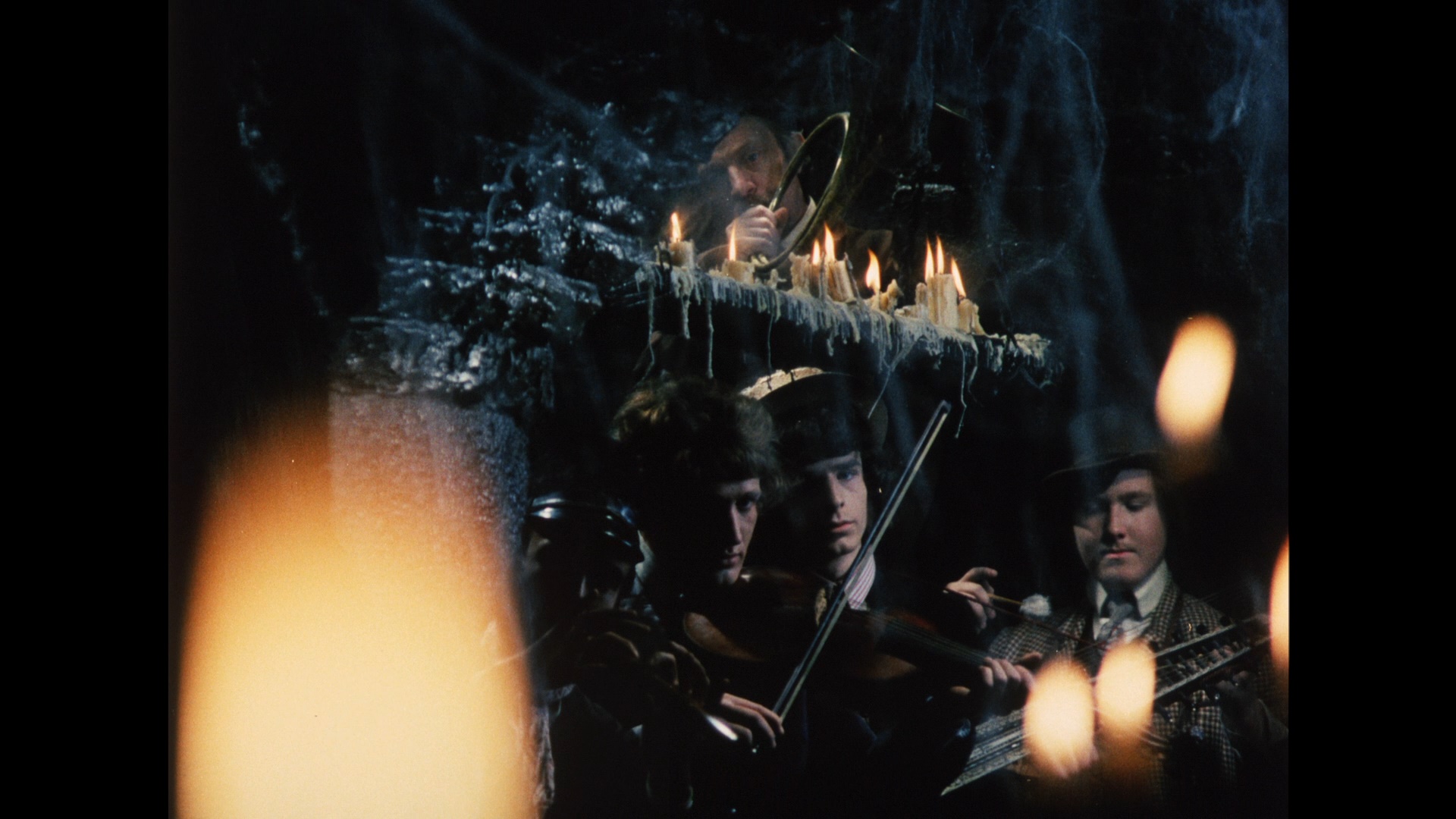 over here, and the top notch Hames and Bird commentary from the German disc is here as well. You also get a robust new audio commentary by the Projection Booth podcast gang (Mike White, Kat Ellinger, and Samm Deighan), who get a lot of mileage talking about the political situation at the time, the use of genre films (and fairy tales) to circumvent governmental restrictions, Nezval's adherence to the Communist Party that probably made the film easier to get into motion, the merits of the film as an adaptation, the subversive depiction of Catholicism, and literary cousins like The Monk. All three of the Jires shorts are here -- "Uncle," "Footprints," and "The Hall of Lost Footsteps" -- with the big news being the first presentation ever of the uncut, much longer version of "Footprints," which now clocks in at 20m53s and plays out far more satisfyingly here in its complete form.
over here, and the top notch Hames and Bird commentary from the German disc is here as well. You also get a robust new audio commentary by the Projection Booth podcast gang (Mike White, Kat Ellinger, and Samm Deighan), who get a lot of mileage talking about the political situation at the time, the use of genre films (and fairy tales) to circumvent governmental restrictions, Nezval's adherence to the Communist Party that probably made the film easier to get into motion, the merits of the film as an adaptation, the subversive depiction of Catholicism, and literary cousins like The Monk. All three of the Jires shorts are here -- "Uncle," "Footprints," and "The Hall of Lost Footsteps" -- with the big news being the first presentation ever of the uncut, much longer version of "Footprints," which now clocks in at 20m53s and plays out far more satisfyingly here in its complete form. 